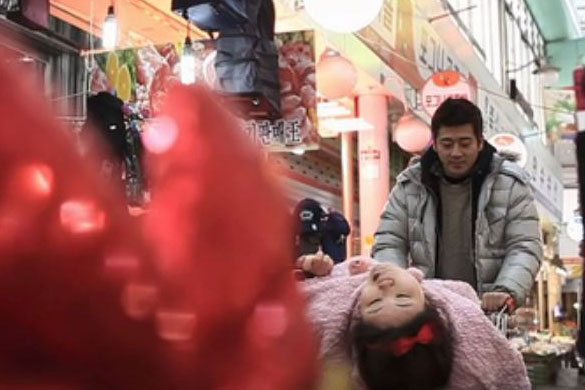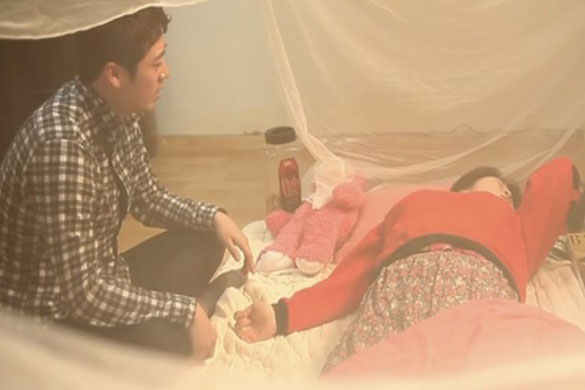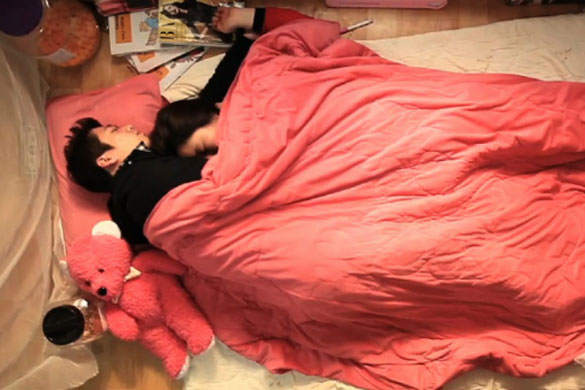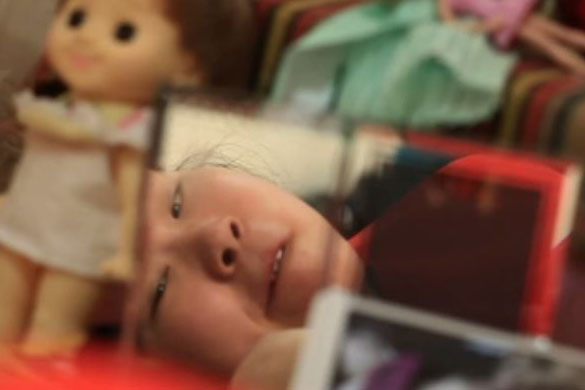"One-sided love is still love..."
Synopsis:
Chul-joong lives - or, more accurately, barely survives - with his severely disabled sister Mi-joong in a tiny, rundown apartment in a less than salubrious area of the city. Wanting nothing more than to have a normal life and provide for his sister, Chul-joong is desperately trying to find the time and indeed energy to study for the civil service exam, but being massively behind on the rent and with no real income to speak of he is instead forced to beg for handouts from his uncle, steal diapers to change Mi-joong when she soils herself, and repeatedly demand that his friend Chang-gi pay him back the money he owes.
At the same time, Mi-joong is in love with Chang-gi, who won't have anything whatsoever to do with her because of her physical handicap.
Well beyond the end of his tether, Chul-joong decides to give Chang-gi an ultimatum: either he pays back the money he owes or Chul-joong will force him to marry Mi-joong...
Review:
'Dirty Romance' begins with gentle piano music (sounding very much like a lullaby) accompanying the camera as it first focuses on a Happy Birthday sign draped across a window and then gently pans down past brightly coloured toys and dolls. One could easily be mistaken for assuming that the vocal sounds that can be heard in the background are those of a baby, but as the image settles on a small mirror we can see Mi-joong reflected, lying on her bed, making those very moans and whimpers herself.
This tiny scene, though it lasts only a moment, perfectly underlines the fact from the very outset that though Mi-joong is an adult she is as helpless and reliant on Chul-joong as a child.
This idea is further accented immediately after the film's title is displayed as Mi-joong is ferried around a market in a shopping trolley. and as she throws a major, top of her lungs tantrum over not being bought a red, sparkly headband we are brought face-to-face with how constant and all-encompassing looking after Mi-joong really is, and as such Chul-joong becoming ever more frayed has a realism that almost cannot fail to hit home, repeatedly.
This first post-title sequence also introduces the character of Deok-ho, a developmentally slow, mentally disabled individual with many similarities to Mi-joong and who is in love with her. Initially, Deok-ho appears as little more than yet another inconvenience to Chul-joong - the young man constantly hangs around Mi-joong's home trying to get a peek at the object of his affection, requiring Chul-joong to almost endlessly chase him away. However, as the narrative progresses Deok-ho comes to play a pivotal role in both the story arcs of the other main characters and indeed in the ultimate outcome of the film as a whole.
Not only that, but the noticeable difference in the way in which Chul-joong interacts with and treats Deok-ho - always dismissive, often suffixing statements by calling him a retard - to that of his caring, humane attitude towards his sister (especially noteworthy considering the similarities of the two) to my mind speaks volumes about the treatment of the mentally disabled by 'normal' members of society who are too wrapped up in their own affairs to bother to look below the surface even though they should and (certainly in the case of Chul-joong) do know better.
 |
Director Lee Sang-woo uses his cinematic, deeply independent, work to focus and indeed shine a light on those on the very edge of Korean society and beyond: the poor, the destitute, the disenfranchised and desperate, and the minorities hemmed in by the very 'norms' they often wish they could be a part of. As such, director Lee’s films are some of the hardest hitting you’re likely to see – even though we’re talking about Korean cinema here, which regularly produces some of the most searing societal critiques imaginable. While ‘Dirty Romance’ fits perfectly into this category, it places its main characters rather closer to ‘normal’ society than many of his earlier films (Chul-joong and Mi-joong seen in a bustling market; Chul-joong traversing busy, neon-lit shopping malls and looking almost longingly at the local police station where he would give anything to work, if he could just manage to complete the civil service exam). As such, each of the main characters is shown to be aware (albeit subconsciously) of how close they are to what they truly want yet constantly see it achingly just out of reach.
To my mind, this idea is underlined by Lee Sang-woo’s perfectly understated camera work, especially in the early stages of the film. We repeatedly see characters reflected in the sides of cars; in dirty, uneven mirrors etc – the camera focusing on the reflection rather than its source – and in doing so ‘Dirty Romance’ positively screams that these individuals are a warped, twisted reflection of society itself. Add to that the fact that the camera also regularly frames the main characters from a deeply voyeuristic perspective – almost hidden and peering through holes and spaces in fences, walls and the like – and one could say there’s an inference that such people are only really seen when specifically sought out, being almost invisible while existing in the peripheral vision of society at large, in the harsh light of day.
While ‘Dirty Romance’ is unquestionably majorly hard-hitting and certainly not what anyone could call an easy watch (if I haven’t hammered that point home already), it does feature a warmth, an approachability and even a beauty that, in my opinion at least, is more noticeable than in Lee’s previous films. The love Chul-joong has for his sister (regardless of the fact that she drives him nuts with her screaming demands a great deal of the time) is absolutely palpable and in fact it is her importance to him (and indeed Deok-ho) that drives their entire character arcs. One scene in particular shows Mi-joong struggling to write letters on a sheet of paper, letters that are later shown to say “I love my brother”, a message that is movingly mirrored by Chul-joong immediately on reading it. In the midst of all the angst, pain and suffering, this brief moment of pure affection cannot fail to draw audiences further into the story, feeling all the more for the characters in the process.
There are also a number of gently humorous moments peppered through ‘Dirty Romance’ – Chang-gi, for example, explaining to Mi-joong that he cannot have sex with her because he does not have an erection, then cringing and running screaming when he realises he has become aroused and has no longer an excuse to refuse her – and these too briefly lighten the load of the deeply serious and even controversial aspects of the movie.
Ultimately, certain areas of the narrative give a glimpse of some of what’s likely to come but rather than being predictable ‘Dirty Romance’ allows viewers to see what needs to be done before the characters even realise it themselves and, throughout, the film retains an originality that ensures that even if you think you’ve sussed out the entire story there are still aspects that will come as a surprise at times, as a shock at others.
 |
As a final note, ‘Dirty Romance’ could even be said to have a moral compass of sorts. While our characters are certainly not innocent or ‘pearly white’ they are clearly people desperately trying to just find a way to live a normal life and care for those close to them, even when their actions stand rather at odds to that idea. However, it is when they undertake decisions and actions to the clear and deliberate detriment of others (Chang-gi choosing to steal a stranger’s wallet, Chul-joong getting tired of masturbating to videos on his phone and deciding to go out and find a real woman, whether she’s willing or not) that karma truly comes to call. Another layer, another level to this already accomplished, thought provoking and important independent film.
As was the case in Lee Sang-woo's 'I Am Trash', 'Dirty Romance' concludes with a somewhat surreal dance sequence featuring Chul-joong, Mi-joong (free from disability) and Deok-ho, all ecstatically happy accompanied by upbeat, happy music. A picture, if you will, of their lives in an ideal world.
However, considering what we've seen in the previous 90 minutes, this scene perhaps more than any other draws poignant attention to the fact that the world for these three has always been and will always be far from ideal.
 |
Summary:
While certainly hard-hitting and wholly in keeping with director Lee Sang-woo's previous work, 'Dirty Romance' has moments of warmth, of understated humour and even of beauty to add layers and further levels to this already accomplished, thought provoking and important independent film.
'Dirty Romance' (더티 로맨스) / 2015 / Directed by Lee Sang-woo
|





